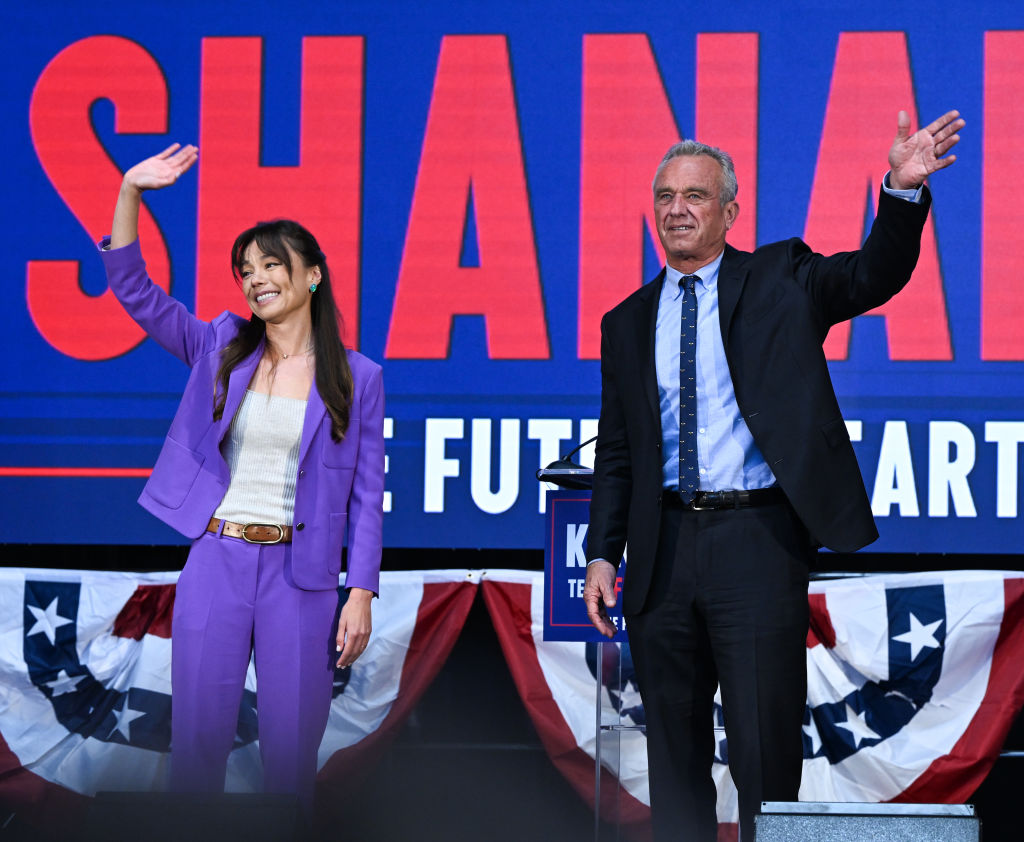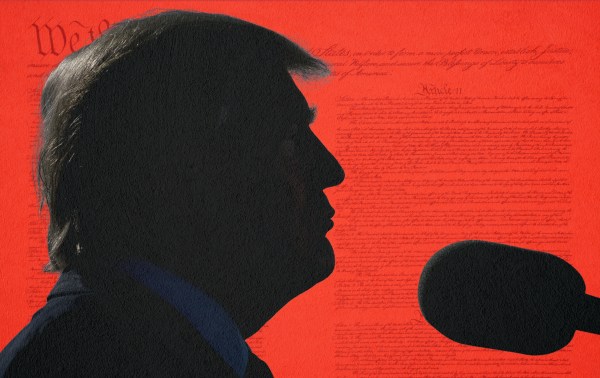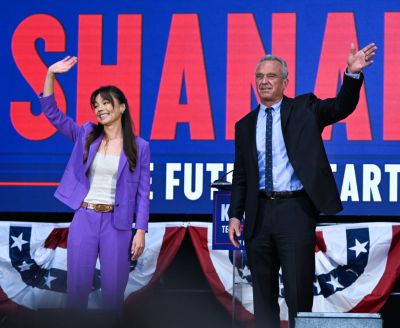Happy Wednesday! Aaron Rodgers did not turn out to be Robert F. Kennedy Jr.’s pick for vice president. Unfortunately for him, it appears he will have an ill-fated season with the New York Jets, given that the Detroit Lions are going to win the Super Bowl. #OnePride!
Up to Speed
- Former President Donald Trump’s trial date for his criminal hush money case in New York has been set for April 15, Judge Juan Merchan ruled on Monday. Trump’s team had attempted to postpone the trial due to prosecutors’ late production of about 100,000 documents related to the case, but Merchan ultimately found there was no prosecutorial misconduct present and no reason for delay. Asked if he would testify at his trial, Trump told ABC News, “I would have no problem testifying. I didn’t do anything wrong.”
- Merchan also issued a gag order for Trump which forbids the former president from speaking about his onetime attorney Michael Cohen and porn star Stormy Daniels, both witnesses in the case. Trump also is prohibited from commenting publicly on the prosecutors and their staff, although he is permitted to speak about Manhattan District Attorney Alvin Bragg and Merchan. “The uncontested record reflecting the Defendant’s prior extra-judicial statements establishes a sufficient risk to the administration of justice … and there exists no less restrictive means to prevent such risk,” the judge wrote in his order.
- NBC News on Tuesday cut ties with former Republican National Committee Chairwoman Ronna McDaniel, less than a week after hiring her and after only one appearance as a contributor for the network on Sunday’s Meet The Press. Puck News was first to report the move. “No organization, particularly a newsroom, can succeed unless it is cohesive and aligned,” NBCUniversal News Group Chair Cesar Conde wrote in a memo to staff. “Over the last few days, it has become clear that this appointment undermines that goal.” McDaniel’s firing comes after an internal revolt from staff at NBC News and MSNBC, which reportedly included anchors vowing not to include McDaniel on their programs.
- Axios reported Monday that Sen. J.D. Vance of Ohio played a significant role in Bernie Moreno’s win in their state’s Republican Senate primary. Vance directed over $1 million to Moreno’s campaign. “It became a running joke how many times we heard ‘J.D. sent me’ from donors both in Ohio and around the country,” Cliff Sims, who helped lead the pro-Moreno Buckeye Values PAC, told Axios. Vance also met with Trump at Mar-a-Lago, the former president’s residence and private social club in Palm Beach, Florida, and convinced him to support Moreno over Ohio Secretary of State Frank LaRose, who finished third. Moreno faces incumbent Sen. Sherrod Brown, a Democrat, in November.
- The Republican State Leadership Committee is advising candidates not solely to attack President Joe Biden on the campaign trail but, rather, to bolster their messaging with affirmations for the GOP, according to Axios. “Steer clear of making the election a singular referendum on Joe Biden,” committee president Dee Duncan advised in a memo. Duncan added that candidates should not use the president “as your crutch” and attributed Republicans’ underwhelming showing in the 2022 midterm elections to only hitting Biden. The RSLC focuses on boosting Republican candidates in state legislative races.
RFK Jr. Introduces Long-Awaited VP Pick

Independent presidential candidate Robert F. Kennedy Jr. on Tuesday announced Nicole Shanahan as his running mate for his third-party bid against President Joe Biden and former President Donald Trump.
The announcement came at a rally in Oakland, California, where Shanahan, a wealthy 38-year-old Silicon Valley patent lawyer, grew up as the child of a low-income family. She has described herself as “a progressive through and through” and has the pedigree to match. Her Bia-Echo Foundation, where she serves as president, focuses chiefly on investment in reproductive technologies, criminal justice reform, and environmental health.
Democrats fear Kennedy’s candidacy could siphon votes from Biden and give Trump an advantage in key swing states, though the independent contender insists he is running to win.
“Our independent run for the presidency is finally going to bring down the Democratic and Republican duopoly that gave us this ruinous debt, chronic disease, endless wars, lockdowns mandates, agency capture—the same Trump-Biden uniparty that has captured and appropriated democracy and turned it over to Blackrock, State Street, and Vanguard and the other corporate donors,” Kennedy claimed. “Nicole Shanahan will help me rally support for our revolution against the uniparty rule from both ends of the right and left political spectrum.”
Taking the stage after Kennedy, Shanahan said she was thankful her running mate took up her niche policy interests, especially regarding toxic chemicals in the soil (about which she has produced two films).
“Healthy soil is the foundation of healthy food. It is the foundation of a healthy ecosystem, and it is our answer to the climate crisis. It is the foundation of a healthy economy,” she said. “But what politician besides Bobby Kennedy do you ever hear talking about soil? None!”
Shanahan also said that she was leaving the Democratic party, accusing its members of having “lost their way in their leadership.” Before joining Kennedy’s campaign she was active in Democratic politics, giving money to then-presidential candidates Pete Buttigieg, Marianne Williamson, and Joe Biden, all in 2020. Her last Democratic contribution was to Rep. Ro Khanna of California in April 2023.
In recent months, though, Shanahan has used her wealth to boost Kennedy. Her $4 million donation to American Values 2024—the super PAC supporting Kennedy—helped finance the acclaimed vintage-style Super Bowl ad that riffed on a famous commercial from the 1960 campaign of his uncle, President John F. Kennedy.
Some Democrats, during a subsequent conference call organized by the Democratic National Committee, seized on the fact that Shanahan is a Kennedy donor, suggesting he picked her to join his ticket because she has deep pockets that could fund his campaign.
“Let’s also be very clear who this vice presidential pick is,” said Rep. Robert Garcia of California. “I mean, we’re talking about someone that has been a megadonor already to his own super-PAC. He is out of money. He is not raising the funds he needs. So of course he’s going to turn to donors.”
Garcia and others on the call, such as Pennsylvania Lt. Gov. Austin Davis, also disputed that Kennedy was running to win, arguing he was in the race to play spoiler and block Biden from a second term. In other words, they said, Kennedy is running to help Trump.
“He has no realistic path to victory in Pennsylvania,” said Davis. “All he can do is take away votes from President Biden and make it easier for Donald Trump to win. And we simply can’t afford to let that happen.”
Kennedy is garnering 10 percent nationally in the RealClearPolitics polling average and has struggled to get his name on the ballot. His campaign has said it has enough signatures to qualify in several states, but so far he is only officially on the ballot in Utah. His announcement of Shanahan comes amid a dispute with Nevada over the state’s ballot.
The Great (Republican) Resignation
House Republicans are in the majority. They control all House committees. Donald Trump, their party’s presumptive presidential nominee, leads President Joe Biden in most polling. And yet some of them can’t quit Congress fast enough.
Rep. Mike Gallagher is just the latest to bolt before his term is up. Despite serving as chairman of a high-profile and influential special select committee formed to address the national security threat posed by the Chinese Communist Party, the Wisconsin Republican announced he would resign April 19 to take a job in the private sector. Gallagher, 40, was already planning to retire at the conclusion of the 118th Congress rather than seek a fifth term. But apparently the once-rising Republican star couldn’t wait any longer, preferring to speed up his House exit by nine months.
He’s not the only one.
Ken Buck, a Colorado Republican, also resigned from the House this month after previously announcing he would forgo reelection despite, he says, having no immediate job prospects. Meanwhile Bill Johnson, an Ohio Republican, resigned in January to become president of Youngstown State University. That followed Kevin McCarthy’s resignation in December, which followed him being ousted as House speaker in October and not wanting to stick around Capitol Hill as a lowly back-bencher.
Aside from the spate of resignations, 18 House Republicans are leaving at year’s end, per a “casualty list” maintained by the House press gallery. What’s remarkable is that some of these members are choosing to call it a career at the apex of their influence and seniority, when they’re in the best position to shape and pass legislation (though in this dysfunctional congress, there’s little opportunity to do so).
Departing members include Rep. Kay Granger of Texas, who last week stepped down as chairwoman of the House Appropriations Committee; Rep. Patrick McHenry of North Carolina, chairman of the House Financial Services Committee; Rep. Blaine Luetkemeyer of Missouri, who was the frontrunner to replace McHenry as the top Republican on Financial Services; Rep. Cathy McMorris Rodgers of Washington state, chairwoman of the House Energy and Commerce Committee. Also on their way out are near-universally respected Reps. Michael Burgess of Texas and Brad Wenstrup of Ohio.
Rep. Mark Green of Tennessee, chairman of the House Homeland Security Committee, had also called it quits before fellow Republicans prevailed on him to reverse course and run for reelection.
It’s not just House Republicans who are seemingly fed up with their jobs. Two dozen House Democrats are headed out the door as well, while two have already resigned mid-term.
So, how does the “take this job and shove it” mentality that seems to have overtaken the 118th Congress compare to past congresses? The Congressional Research Service has some statistics on the matter, dating to the 101st Congress that met in 1989 and 1990. Here’s a selection of congresses in which the resignations and retirements by Democrats and Republicans were relatively robust:
- 101st Congress: nine resignations and 15 retired.
- 102nd Congress: Seven resignations and 51 retirements
- 103rd Congress: Six resignations and 28 retirements
- 104th Congress: Eight resignations and 32 retirements
- 111th Congress: 12 resignations and 19 retirements
- 115th Congress: 15 resignations and 32 retirements
- 116th Congress: Eight resignations and 28 retirements
In other words, the total resignations and retirements so far this Congress aren’t necessarily breaking records—at least not yet. Still, the number of veteran Republicans positioned to wield legislative power who are headed for the door is unusual in light of the facts that political prognosticators are not forecasting a Democratic wave on November 5, and some Republican insiders are bullish on the party’s chances of expanding its razor-thin majority.
Notable and Quotable
“Happy Holy Week! Let’s Make America Pray Again. As we lead into Good Friday and Easter, I encourage you to get a copy of the God Bless The USA Bible.”
—Former President Donald Trump in a Tuesday Truth Social post.







Please note that we at The Dispatch hold ourselves, our work, and our commenters to a higher standard than other places on the internet. We welcome comments that foster genuine debate or discussion—including comments critical of us or our work—but responses that include ad hominem attacks on fellow Dispatch members or are intended to stoke fear and anger may be moderated.
With your membership, you only have the ability to comment on The Morning Dispatch articles. Consider upgrading to join the conversation everywhere.